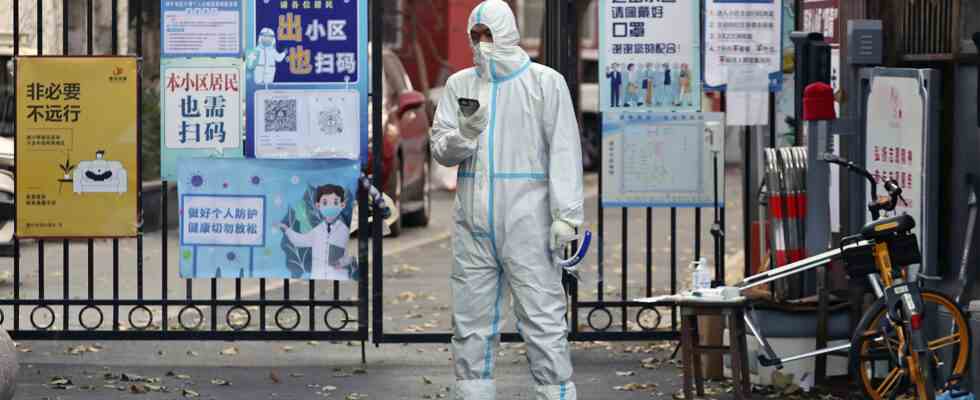Status: 07.12.2022 07:24
IIn the fight against the corona pandemic, China has relaxed its strict zero-Covid measures somewhat. The State Council announced a new ten-point plan with relief for quarantine, PCR tests and lockdowns.
China has announced nationwide easing of its zero-Covid policy. The new guidelines of the National Health Commission (NHC) stipulate, among other things, that infected people with no or mild symptoms can “generally isolate themselves at home”. After a week of home quarantine, two negative PCR tests are then necessary in order to be able to move freely again. Close contacts should isolate themselves at home for five days and then be able to test freely.
In China, people who tested positive for Covid had to quarantine in central government facilities. Lockdowns should now only apply to buildings, residential units, floors or households – not “arbitrarily” extended to districts, streets or the entire area, as the State Council further announced.
Fewer corona tests in the future
The country also wants to reduce the scope and frequency of corona tests. Mandatory tests should therefore be limited to “high risk” areas and schools in the future. The mass testing was one of the cornerstones of the Chinese government’s zero-Covid policy.
A negative PCR test will no longer be generally necessary in the future – except for staff in primary and secondary schools, medical facilities, nursing homes or orphanages, it said. Important state organs, large companies and other special institutions could still act according to their own prevention plans.
No tests when traveling
In addition, a negative test is no longer necessary before traveling, and you no longer have to be tested on arrival. There should be no movement restrictions in non-high-risk areas.
Protests against tough Corona course
The ongoing strict restrictions after almost three years of the pandemic had caused resentment in the country. Almost two weeks ago, the largest wave of protests in decades rolled through various Chinese cities.
What began with protests against China’s zero-Covid policy and the associated lockdowns soon turned against President Xi Jinping and the Communist Party in general. In view of the protests, several large cities such as Beijing and Shanghai had recently relaxed their corona measures.
Does the healthcare system hold up?
However, the current simplifications go far beyond that. For a few weeks now, China has been hit by the largest wave of infections since the pandemic began – even if the absolute numbers are low by international comparison. It is now feared that the numbers could rise significantly again. Experts warn that the poorly developed health system could be overwhelmed.
The Health Commission reported on Wednesday about 25,000 new infections in one day. The numbers have been falling for days after peaking at around 40,000 in late November.
Older people should be vaccinated more frequently
Vice Prime Minister Sun Chunlan indicated last week that there could be a change of course. She spoke of a new phase, since the omicron variant was no longer so pathogenic and more people were vaccinated.
However, the vaccination of older people in particular, who are insufficiently protected by vaccines in China, should be promoted. For fear of side effects, older people in the country of 1.4 billion people have so far been vaccinated less. Only 40 percent of people over the age of 80 have received a booster shot.
There is also a lack of natural immunity in the population, as isolated China has hardly seen any infections so far.

